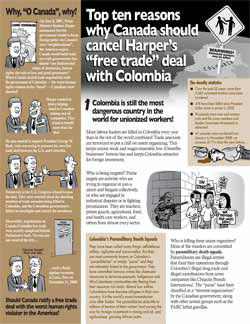This is an archive of news stories and research from the National Union of Public and General Employees. Please see our new site - https://nupge.ca - for the most current information.
'Since 1991, more than 2,245 trade union leaders and activists have been assassinated in Colombia.' - James Clancy
 Ottawa (27 March 2009) - The National Union of Public and General Employees (NUPGE) is appealing to the federal Liberal Party to join with other opposition parties to block the new Canada-Colombia Free Trade Agreement.
Ottawa (27 March 2009) - The National Union of Public and General Employees (NUPGE) is appealing to the federal Liberal Party to join with other opposition parties to block the new Canada-Colombia Free Trade Agreement.
Legislation to implement the agreement was introduced in the Commons on March 26.
NUPGE president James Clancy, in a letter to Liberal Leader Michael Ignatieff, says it is "deeply inappropriate" for Canada to sign an agreement with the brutal Colombian regime of President Alvaro Uribe.
"I am asking that your party join with the New Democratic Party and Bloc Québécois in opposing this agreement," Clancy writes.
"I am sure, given your background in international human rights issues, that you appreciate the severity of the human rights crisis in Colombia. The scope and magnitude of the violence is deeply troubling and the suffering of the Colombian people immense," he adds.
"Very little of the violence that occurs in Colombia is related to 'military' objectives. Attacks are primarily perpetrated against unarmed campesinas, workers, and the leaders of trade unions and popular social movements. Despite the assurances of the Colombian government that the situation is improving the violence continues."
Clancy criticizes the Harper Conservative government for going ahead with the deal "despite horrific human rights violations" that have occurred with little or no resistance from the Colombian government, or its "outright complicity".
"Since 1991, more than 2,245 trade union leaders and activists have been assassinated in Colombia. At least 8,000 have suffered threats, arbitrary detention, kidnapping, torture and disappearances," Clancy says.
"More than 80% of the casualties of the 'war' in Colombia are civilians. Estimates are that the guerrilla movements are responsible for about 5% of the deaths, the army for about 10% and right-wing paramilitary forces for about 85%. Colombia remains the most dangerous country in the world to be a trade unionist or human rights activist."
The National Union participated in an international solidarity mission to Colombia this past summer. The leaders of four Canadian public sector unions met with a broad range of labour, aboriginal, Afro-Colombian, peasant and civil society organizations.
 "The overwhelming opinion of these organizations was that free trade with Colombia will lead to worse human and labour rights abuses and further devastation of communities at risk," Clancy says.
"The overwhelming opinion of these organizations was that free trade with Colombia will lead to worse human and labour rights abuses and further devastation of communities at risk," Clancy says.
"These leaders reached the similar conclusion that a free trade agreement will not help the Colombian people. It will only exacerbate an already horrifying list of human and labour rights abuses that are shocking the world.
"It is deeply inappropriate for the Canadian government to ignore the pleas for assistance from some of the most persecuted and embattled people in the world," Clancy writes.
"Canada can, and should, play a leadership role in ensuring that a just and sustainable peace is achieved in Colombia. As an expert on international human rights I know that you appreciate the seriousness of this matter. I urge you and your party to oppose the proposed agreement."
NUPGE
The National Union of Public and General Employees (NUPGE) is one of Canada's largest labour organizations with over 340,000 members. Our mission is to improve the lives of working families and to build a stronger Canada by ensuring our common wealth is used for the common good. NUPGE
More information:
CLC Publication: Top ten reasons why Canada should cancel Harper's "free trade" deal with Colombia - pdf
